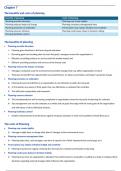Summary
Summary Introduction to Business Management Chapter 7 Complete
- Institution
- Rosebank College
This document provides an in depth and thorough summary of chapter 7 of Introduction to Business Management 11th edition (Erasmus et. al.). It is ready for exam and tests. Everything is laid out as it is in the textbook. All needed information is provided in short. It is written in an easy to study...
[Show more]




